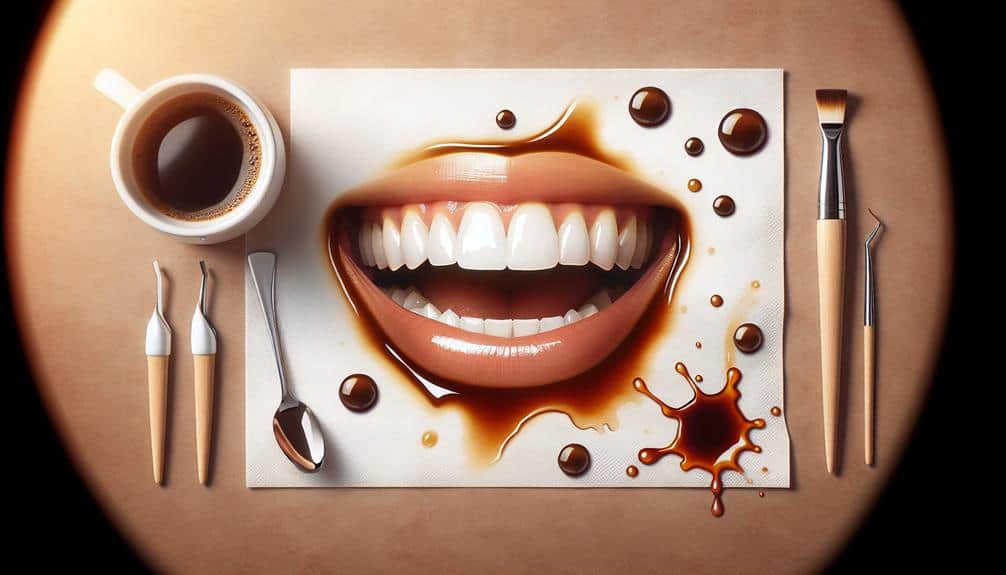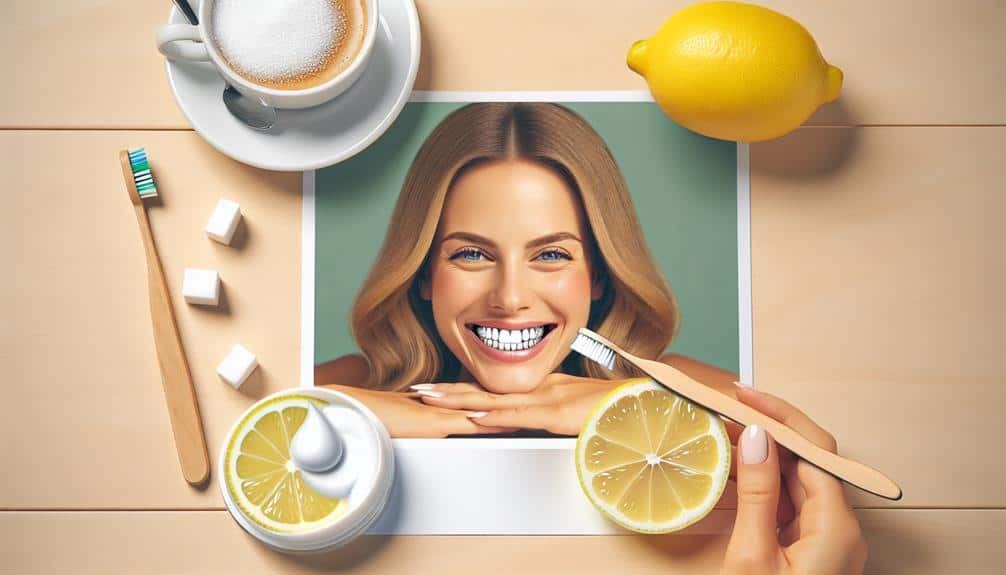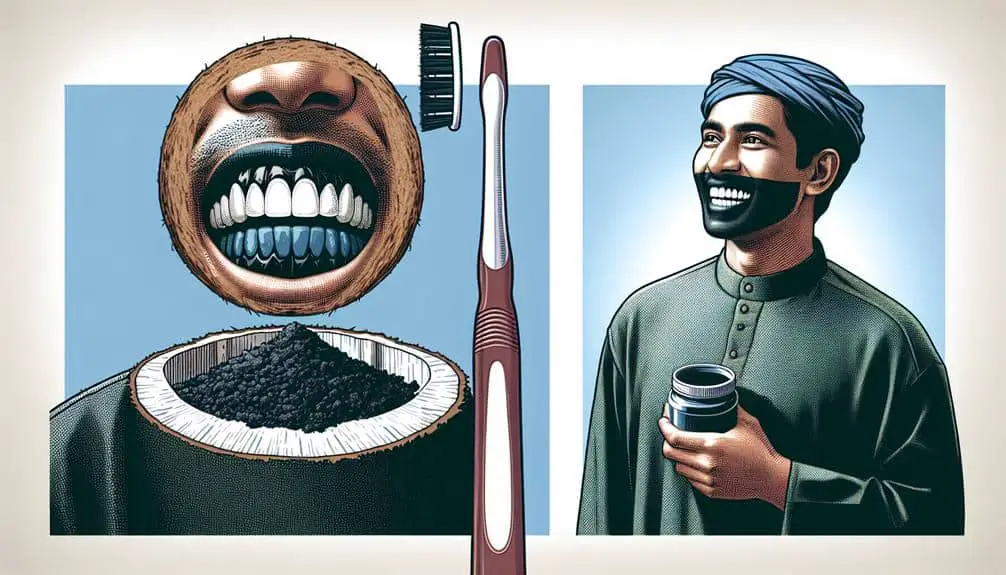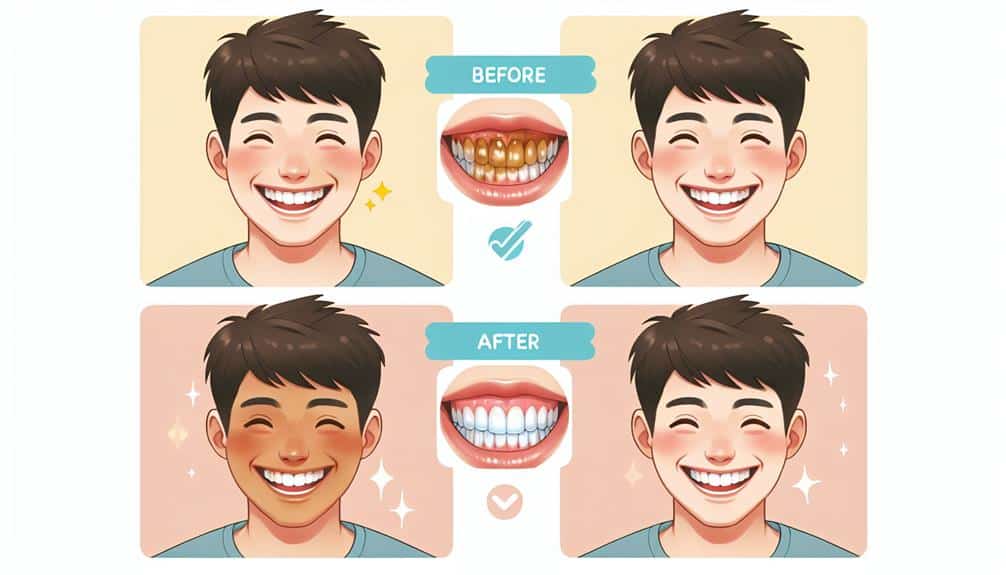When you remove coffee stains, you brighten your teeth by eliminating the surface discoloration caused by coffee pigments sticking to your enamel. This process reveals the natural whiteness underneath. The discoloration from coffee can make teeth appear dull and yellow. By removing these stains, your teeth look whiter and brighter. Deeper insights into the benefits of coffee stain removal and ways to maintain a stain-free smile can enhance your understanding of how to achieve and sustain brighter teeth.
Key Points
- Coffee stain removal eliminates surface stains, enhancing the natural whiteness of teeth.
- It reduces discoloration, improving the appearance of teeth through cosmetic dentistry methods.
- By removing coffee stains, teeth maintain their white color, promoting a brighter smile.
- The process preserves the enamel by removing stains, contributing to a brighter and healthier smile.
- Overall, coffee stain removal treatments effectively brighten teeth by targeting and removing surface discoloration.
Benefits of Coffee Stain Removal
Regular coffee stain removal not only enhances the appearance of your teeth but also contributes to better oral health by reducing the risk of stains and discoloration. Cosmetic dentistry focuses on improving the aesthetics of your smile, and maintaining white teeth is a key aspect of this field. Stains from coffee can lead to discoloration, making your teeth appear dull and less attractive. By actively engaging in coffee stain removal, you're taking a critical step towards preserving the natural whiteness of your teeth, aligning with the principles of cosmetic dentistry.
Moreover, good oral hygiene is essential for overall health, and removing coffee stains plays a significant role in this aspect. Stains on the teeth can harbor bacteria, leading to potential oral health issues like cavities and gum disease. By prioritizing regular coffee stain removal, you aren't only enhancing the visual appeal of your smile but also supporting your oral hygiene efforts for a healthier mouth.
DIY Coffee Stain Removal Methods
To effectively combat coffee stains on your teeth, explore simple and practical do-it-yourself methods that can help restore a brighter smile. Two common household items that are often used for DIY coffee stain removal are lemon juice and baking soda. Lemon juice contains citric acid, which has natural bleaching properties that can help lighten stains on the teeth. Baking soda, on the other hand, is mildly abrasive and can gently scrub away surface stains caused by coffee or other dark-colored beverages.
To create a homemade teeth-whitening paste, mix a small amount of lemon juice with baking soda to form a paste-like consistency. Gently apply this mixture to your teeth using a toothbrush or your finger, being careful to avoid the gums as lemon juice can be acidic. Let the paste sit on your teeth for a minute or two before rinsing thoroughly. Remember not to use this method too frequently as the acidic nature of lemon juice can potentially harm your tooth enamel over time. These simple DIY methods can be a cost-effective way to help combat coffee stains and brighten your smile.
Professional Whitening Treatments
Consider professional whitening treatments for a thorough and effective solution to stubborn coffee stains on your teeth. Professional whitening treatments, commonly offered in cosmetic dentistry practices, use powerful bleaching agents to remove deep-seated stains and brighten your smile. These treatments are administered by trained professionals who can customize the procedure to suit your specific needs and guarantee best results.
One of the key benefits of professional whitening treatments is the enamel protection they provide. While over-the-counter whitening products may lead to enamel damage if not used correctly, professional treatments are conducted under controlled conditions to minimize risks. Additionally, professional whitening treatments are often more potent, delivering faster and more noticeable results compared to DIY methods.
Natural Remedies for Brighter Teeth
For brighter teeth using natural remedies, explore the efficacy of ingredients like baking soda and hydrogen peroxide. Baking soda, or sodium bicarbonate, is a popular natural remedy for teeth whitening due to its mild abrasiveness that helps scrub away surface stains. You can create a paste by mixing baking soda with water and brushing your teeth gently with it.
Additionally, hydrogen peroxide is known for its whitening properties and can be used as a mouthwash when diluted with water. Oil pulling, another natural method, involves swishing oil around in your mouth to help remove bacteria and stains. Coconut oil is commonly used for this practice.
When utilizing natural remedies, it's crucial to be cautious as excessive use can lead to enamel erosion or gum irritation. It's recommended to consult with a dentist before trying these methods, especially if you have sensitive teeth or existing dental issues. Incorporating these natural remedies into your oral care routine can help maintain a brighter smile between professional whitening treatments.
Maintaining a Stain-Free Smile
Maintain a stain-free smile by incorporating daily oral hygiene practices that target plaque and surface discoloration. Prevention is key to avoiding tooth discoloration caused by factors such as coffee, tea, and smoking.
Brushing your teeth at least twice a day using a fluoride toothpaste helps remove plaque buildup, preventing it from hardening into tartar, which can lead to stains. Flossing daily is important as it removes food particles and plaque from between your teeth, where your toothbrush may not reach.
Consider using an antiseptic mouthwash to reduce bacteria in your mouth, which can cause staining. Regular dental cleanings are essential for removing surface stains and maintaining oral health. Additionally, be mindful of your diet; limit foods and drinks that are known to cause discoloration.
Frequently Asked Questions
How Long Does It Take for Coffee Stains to Develop on Teeth?
Tooth enamel is vulnerable to staining. Coffee stains can develop gradually based on brushing habits. Consistent brushing can reduce the progression of stains. Effective brushing techniques and regular dental cleanings can help prevent and minimize coffee stain buildup on teeth.
Can Certain Foods or Drinks Prevent Coffee Stains From Forming on Teeth?
Looking to keep your pearly whites bright? Preventive measures like choosing teeth-friendly diet options can help. Foods and drinks with high water content, like fruits and veggies, can naturally cleanse and protect your teeth.
Are There Any Long-Term Effects of Not Removing Coffee Stains From Teeth?
Neglecting coffee stains on your teeth can lead to long-term dental health issues. Discoloration from coffee can worsen without proper removal, impacting your oral hygiene and causing yellowing. Regular cleaning prevents these effects.
What Are Some Common Misconceptions About Coffee Stain Removal on Teeth?
When it comes to common misconceptions about coffee stain removal on teeth, many believe natural remedies work wonders while underestimating the effectiveness of professional treatments. However, professional methods can yield long-lasting results despite potential cost implications.
Can Genetics Play a Role in How Easily Coffee Stains Teeth?
Genetic factors can indeed influence how easily coffee stains your teeth. While genetics play a role, maintaining good dental care habits can help mitigate these effects. Consistent brushing, regular cleanings, and avoiding excessive coffee consumption are key.



